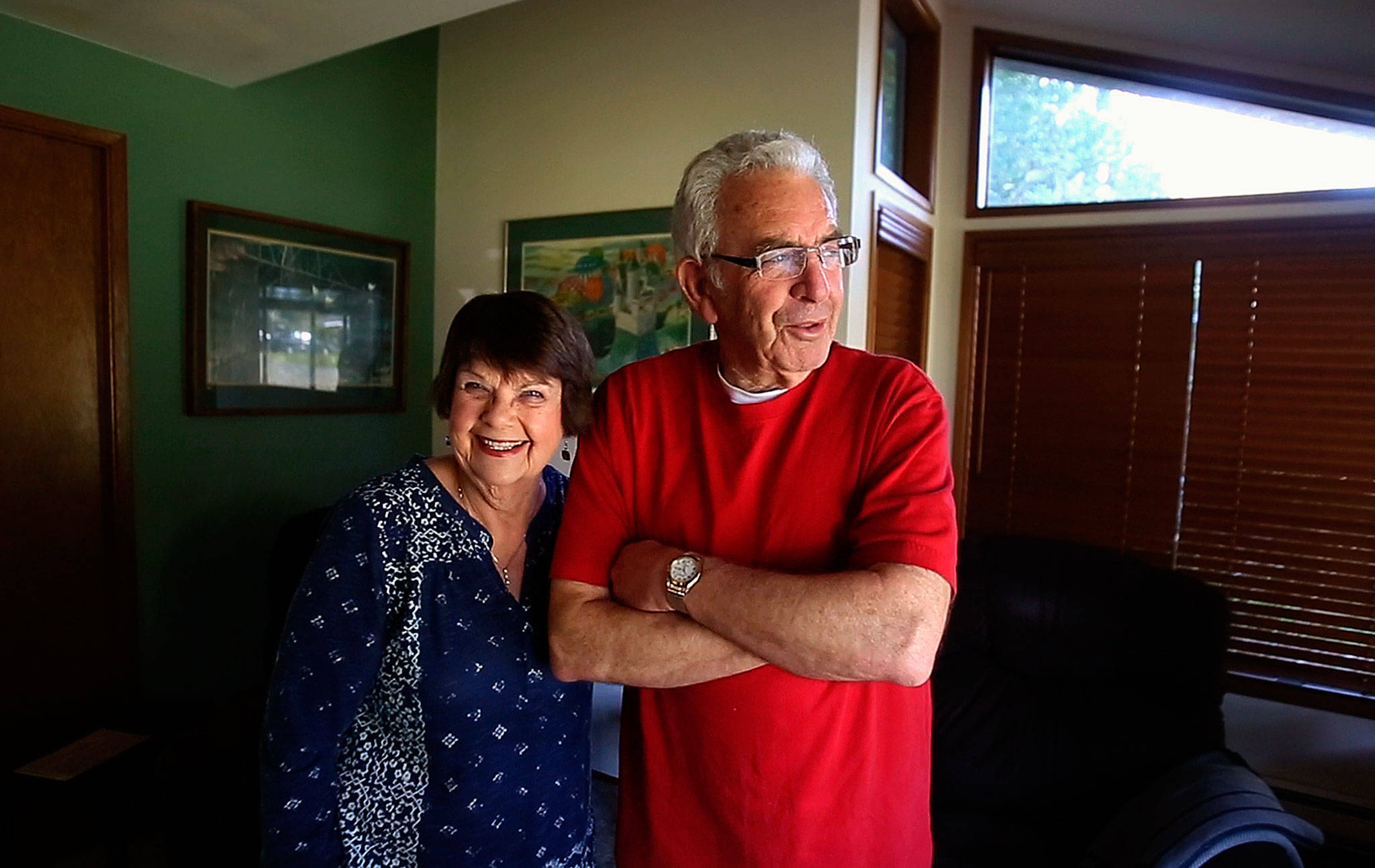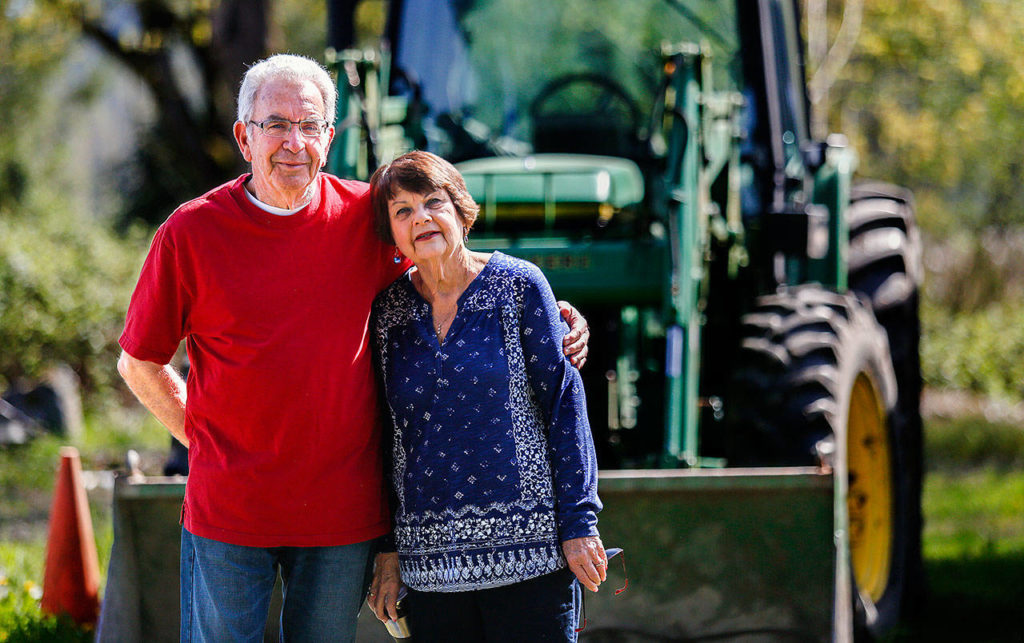MONROE — Charlene Reiner’s favorite place in the world is just across the Lewis Street Bridge, heading out of Monroe.
Take the first left, and there it is: The pond her husband dug, near the overgrown Christmas tree lot on the farm they ran for years. The couple often grab hamburgers in town, and bring them here for picnics.
Some parts of the farm have been in Dale Reiner’s family for more than 100 years. He and Charlene grew up here, and raised their children here.
On March 16, they sold to PCC Farmland Trust, which promises to preserve the farm forever. The property is 260 acres, and includes two miles bordering the Skykomish River. That’s prime salmon habitat, which the Tulalip Tribes plan to care for.
Farming for a century
Dale’s great-grandparents moved to Monroe in 1873 from California. His great-grandmother was pregnant during the journey up the coast. His grandfather was born soon after.
The family settled on 160 acres in Tualco Valley. One of the original houses is still there.
The Reiners became dairy farmers, and had a large role in bringing the Carnation milk condensery to Monroe. The plant burned down in 1944, but its smokestack still stands.
Dale’s grandfather inherited the family’s original homestead and ended up selling most of it, just like he would corn or cattle. The family kept about 6 acres, which is where Dale grew up. He and Charlene still live there.
“That’s why we’ve been in farming for more than 100 years,” Dale said. “Even though we’ve jumped around doing different things, we’ve always had some kind of a tie to the homestead.”
Charlene grew up right down the street.
The couple’s parents all had been good friends since high school. Dale was born first, and Charlene a year later.
“We started playing together when we were small enough to fit in a No. 2 wash tub,” Dale said.
“That’s the kind you bob for apples in,” Charlene added.
Meant to be
The couple has pictures around the house of themselves playing together as children. In one photo, Dale is wearing a suit and fake mustache. Charlene is in one of her mother’s dresses. They were performing songs at the Tualco Grange. They must have been 4 and 5 at the time, Dale said.
As they got older, Dale decided he didn’t want to play with girls anymore and stopped hanging around Charlene. He bought his first car at 16, and would drive through mud puddles to splash Charlene as she waited for the school bus in front of his house.
He joined the U.S. Marine Corps after high school. Charlene went to college at Washington State University. They didn’t see each other for years.
Charlene came back to Monroe at some point in the early 1960s for a visit. Dale just happened to be home at the same time. She called to ask if he’d like to come over for one of her mother’s famous cinnamon rolls.
“I don’t know why I did it,” Charlene said. “I think we probably said two words to each other.”
There must have been some sort of attraction, because the next night Dale took her to dinner. They wanted to see each other the morning after their date, and met in the middle of what is now Highway 203 in Monroe.
Their parents and all the neighbors stuck their heads out the windows to see what Dale and Charlene were up to.
“His folks and my folks were just very busy discussing whether that was a good thing or a bad thing,” she said.
Dale and Charlene were married in 1965.
After the wedding, Charlene decided she wanted a dachshund. Dale used his last $30 to buy one for her. They’ve kept the same type of dog ever since.
The couple had a son and a daughter and raised them on the same patch of land where Dale was raised.
Dale and his brother started a construction business, which morphed into a logging business. Once they got bored with that, they started buying farming equipment and went to work in the fields.
“Most of the stuff I ever did, I didn’t know a blooming thing about,” Dale said. “After I figured out how to do something, I always picked up something else I didn’t know how to do.”
Working on farms inspired him to get back to his roots.
In 1990, Dale started buying land. Some of it had been part of his great-grandparents’ original homestead.
“I almost look at it like he was going home again,” Charlene said.
Preserving the farm
Decades passed. They decided to sell to PCC Farmland Trust more than a year ago. Around the same time Dale suffered a heart attack, which he’s still recovering from. Both his children have full-time careers. There wasn’t anybody who could take care of the farm.
The Reiners wanted to make sure whoever bought the land would love it as they did.
“They had respect for it, and I think that’s a big word. I think they could see the potential from all the work Dale put into it,” Charlene said.
PCC Farmland Trust works exclusively in Washington, and has protected 21 farms since 1999.
For the past three years, Dale and the trust have been working together to make sure it was a good fit, said Melissa Campbell, PCC Farmland Trust associate director.
“Dale’s been a longtime champion of conservation,” Campbell said. “The property is outstanding. It has many features of community interest. It’s right at the doorstep of Monroe, so it’s highly vulnerable to development.”
The Reiner property is about three times larger than the typical Snohomish County farm, she said.
The organization raised $3.4 million to buy the land, which is now preserved through a conservation easement. This also keeps it affordable for future buyers, who must agree to only use it for agriculture. The trust hopes to sell the property to another farmer within a decade.
As Snohomish County’s population grows, land is becoming too expensive for the average farmer, Campbell said. Many are getting ready to retire, without anyone to take their place, so it’s important now to preserve farms, she said.
The trust is partnering with the Tulalip Tribes. The tribes have worked on the Reiners’ property before.
The stretch of the Skykomish River that borders the farm is one of the most important places for salmon production in the entire Snohomish basin, said Brett Shattuck, Tulalip Tribes restoration ecologist.
“It’s not a particularly rosy picture, unfortunately,” he said. “Most salmon stocks, especially recently, have been declining.”
While all types of salmon migrate through the area, it’s especially important to chinook, which rear and spawn on the Skykomish. The species has been endangered for more than a decade.
Letting the river evolve naturally is one of the best ways to protect the fish, he said.
“We expect, especially in the near term, for the whole property and existing uses to stay very similar to what they currently are now,” Shattuck said. “I think that’s one of the best things the project has, is conserving existing conditions while allowing opportunity for future enhancement.”
Still going to visit
Dale and Charlene are glad they can visit the farm every once in a while, the way they left it. They live just a few driveways down.
Dale expects to be on-call for any questions the new owners might have, although he doesn’t want his old job back, he said.
“He knows every nook and cranny and every tree that was grown, chopped down, or otherwise,” Charlene said. “Though it was time for him to move on, and because it’s going into agriculture, he can still go over to where he’s done his work and enjoy it.”
Charlene’s looking forward to her next burger at the pond.
Stephanie Davey: 425-339-3192; sdavey@heraldnet.com.
Talk to us
> Give us your news tips.
> Send us a letter to the editor.
> More Herald contact information.






























